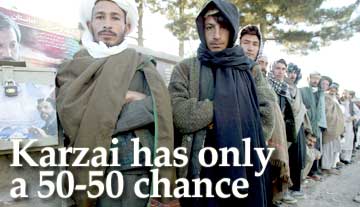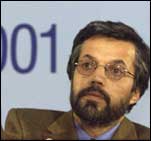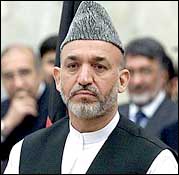
Professor T Sreedhar, former academician at the Institute of Defence Studies and Analyses and former professor at the Jawaharlal Nehru University, New Delhi, is probably India's foremost expert on Afghanistan today.
Sreedhar, who has been studying Afghan politics and society for several years now, has co-authored and edited many books and articles on the trouble-torn country. Three of his important studies are 'Afghanistan in Transition', 'Afghan Buzkashi: Power Games and Gamesmen', and 'Taliban and the Afghan Turmoil: The Role of USA, Pakistan, Iran and China'.
With Afghanistan going to the polls today, who better than Professor Sreedhar to put the exercise in perspective and analyse the situation in the country?
On the importance of the election: In the documented history of Afghanistan there have been no such fair and free elections based on adult franchise. This is the first time the United Nations, a neutral agency, has got formally associated with the election process in Afghanistan; the first time a woman candidate is being allowed to participate in the presidential election; the first time a written constitution is ensuring the fundamental rights of the Afghan people.
The UN-Afghan Joint Commission for Elections is putting things in order for the first time. People are now allowed to make a choice; they can select their president. Now, in that region, only Iran and Afghanistan can lay claim to fair elections. Even Pakistan can't boast of free and fair elections. All around Afghanistan and Iran it's either anarchy, authoritarianism, or monarchy.
After 20 years of anarchy in Afghanistan, people have decided to dispense with the monarchy and establish a democratic people's republic. This is a huge, qualitative change. People have volunteered to bring democracy into their country. Ten and a half million people have enlisted on the UN's voter lists, which means almost 50 per cent of the population has come out for change. This is unheard of in the contemporary history of that part of the world.
On the flip side of the election: I have mixed feelings. A political experiment is being done by the United Nations. But the extra-regional powers which are present in Afghanistan's polity are trying to influence the election and not allowing the event to take its own course. As a result, even if, say, A candidate wins, it is not going to be a clean fight. All American idiosyncrasies are being imposed in Afghanistan and that worries us. If results are not going to be fair, then Afghan society will be divided further.
The Americans may have good intentions, but their presence in Afghanistan has screwed up for a variety of reasons. Partly because Americans linked up the Pakistani support to the global fight against terrorism to Afghanistan's drive to democracy. In the bazaars of Kabul and Mazar-e-Sharif people say the Americans are doing exactly what the Pakistanis want.
In the post-Taliban era, the Pakistanis are looked upon as the villains. They are blamed for Afghanistan's misery from 1979 to 2001. Local people have too much animosity towards Pakistan. And anyone carrying their agenda will not be accepted in the long term.
Here, one has to understand the way Afghans look upon an adversary. For Kabuliwallahs you are either friend or foe; there are no grey areas.
 From 2001 to 2004 the greatest disservice Americans have done to Afghan polity is to look at the country through the prism of ethnic groups. For them they are Pashtuns, they are Tajiks, Uzbeks, and Hazaras. They are dealing with the problem through ethnic dimensions. As a result, the national reconciliation that India has articulated has not taken firm roots. Here Hamid Karzai, interim president, has also failed. Ethnic divisions have crept in fully. As a result distortions are coming up. It is very important to note that this election is fast turning into a Pashtun versus non-Pashtun contest. The pre-election polarisation is clear. Pashtuns are represented by Karzai. Non-Pashtuns are being represented by Yunus Qanooni.
From 2001 to 2004 the greatest disservice Americans have done to Afghan polity is to look at the country through the prism of ethnic groups. For them they are Pashtuns, they are Tajiks, Uzbeks, and Hazaras. They are dealing with the problem through ethnic dimensions. As a result, the national reconciliation that India has articulated has not taken firm roots. Here Hamid Karzai, interim president, has also failed. Ethnic divisions have crept in fully. As a result distortions are coming up. It is very important to note that this election is fast turning into a Pashtun versus non-Pashtun contest. The pre-election polarisation is clear. Pashtuns are represented by Karzai. Non-Pashtuns are being represented by Yunus Qanooni.
The Pakistan factor is also a negative force in the election. By supporting America's fight against terrorism Pakistan got a role to play in the Afghan elections. It's a quid pro quo.
There are 1.8 million refugees stationed in Pakistan. Around 50 per cent of them have voting rights. It is reported that they are being coerced to vote for Karzai. It is alleged that they have been told that if he is not elected the retaliation will be brutal. There are 1.2 million Afghan refugees in Iran too. They are largely anti-Taliban and strongly in favour of peace.
Overall I expect a mixed result. There will be wild allegations, but still there will be a fair and free election.
 On Afghanistan's President Hamid Karzai:
On Afghanistan's President Hamid Karzai:
Announcement of the election results could be deferred if Karzai is not winning. In the first round of election, it is expected that Karzai will not get 50 per cent of the votes. That means in the second round there will be a straight fight between the first two candidates, probably between Qanooni and Karzai. It will be anybody's guess then. Again, those results could be announced after the American presidential election.
I am not sure whether what the Americans are doing is working against or for Karzai. Afghanistan is a ferocious nation. They will kill their mother, but not give up their national interest. Karzai's father was killed by the ISI. The typical Afghan tradition is to never forgive such assault. Afghanis don't appreciate Karzai's softer relations with Pakistan.
Why is Karzai unable to expand his writ beyond Kabul? Because he came to power with extra-regional powers. The American influence is too visible. Also, the Pakistan factor. It's said that Hamid Karzai will not remain neutral after stage one of the election. Once the battle lines are drawn, his currrent anti-Pakistan posture will change.
Also, Karzai is facing a division of the Pashtun votes. There are mainly two tribes of Pashtuns Gilzai and Durani. All the traditional rulers and kings were Durani. Karzai is Durani too. But Mullah Omar of the Taliban was Gilzai. They had got the chance of a lifetime [to rule Afghanistan] until America attacked them.
On India's involvement with Afghanistan: India has provided logistical support for the elections. But we have not kept all our eggs in one basket. We haven't helped the Americans either. The issue being debated is that if Karzai wins, is he going to succumb to Pakistani pressure or will he put an end to the American-Pakistani nexus in Kabul?
Pakistan has a concept called moderate Taliban. They want that group in power. India is for stability. A stable Afghanistan is in India's best interests to reach West Asia and Central Asia. More important is that a stable Afghanistan means an end to drug trafficking and terrorism.
On the Pakistan factor: Islamabad is trying its level best to see that the Durani Pashtuns win because they are in a majority in the North West Frontier Province and Balochistan. Pakistan is dividing the Gilzais and Duranis. It is to be seen now whether the race is closer between Pashtuns and non-Pashtuns or Gilzais and Duranis. The Taliban's Mullah Omar and [rebel leader] Gulbuddin Hekmatyar are also active. The violent attacks against the Karzai government are their handiwork. Reportedly, the Americans are claiming that they have succeeded in dividing the Taliban and Al Qaeda. If the Taliban tries to take sides openly, Pashtun votes will get further divided.
On American interests in Afghanistan: The Afghan election might be ridiculed as an American road show, but its impact on the American voters is hyped. Iraq is going to influence American voters much more. Americans should worry more about rising oil prices. Al Qaeda is working towards hitting the oil supply mechanism. The Americanisation of West Asia and its impact on the American economy will be so enormous that Karzai's winning or losing will become inconsequential.
Photographs: BEHROUZ MEHRI/AFP/Getty Images | Headline Design: Rahil Shaikh
(Professor Sreedhar spoke to Senior Editor Sheela Bhatt)





